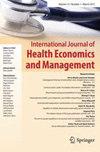保加利亚学生对将健康教育作为一门新学科纳入高中课程的态度
IF 1.5
4区 经济学
Q3 BUSINESS, FINANCE
International Journal of Health Economics and Management
Pub Date : 2021-03-14
DOI:10.14748/HEM.V20I2.7676
引用次数: 0
摘要
健康教育作为一门学校学科,向高中生介绍健康知识,培养负责任的健康行为态度。学校系统是仅次于家庭的第二好地方,在那里孩子们被社会化和接受教育。健康促进是改善或改变与健康有关的生活方式的有效方法。本研究的目的是研究保加利亚中学生对在学校课程中增设健康教育科目的态度和意见。材料与方法:对现有的学生健康教育框架和方案进行研究。利用官方政策和规范性文件研究了关于保加利亚学生儿童福利状况和健康态度的现有数据。通过对保加利亚不同地区的学生进行调查,收集了新的数据。共有720名学生参加了调查,年龄在9岁到19岁之间,从5年级到12年级。学生们被要求填写一份由第一作者制作的问卷。对收集到的数据进行统计分析,并根据结果得出结论。结果:调查结果显示健康的生活方式在年轻人中很受欢迎。总的来说,他们相信医疗专家和医疗机构提供的信息。每学年,健康问题在学校被正式讨论过几次。学生们认为开设一门新的健康教育课程会非常有用,他们会参加课程,特别是如果有医疗保健专家讲授这门课程。研究表明,七年级(14岁)学生对健康教育的期望和需求最大。结论:现有的研究表明,保加利亚的健康教育仍远未达到应有的水平。只有大城市的学生对健康和健康行为有充分的了解。此外,保加利亚青年一贯报告健康行为不良和健康状况不佳。另一方面,在本研究中,儿童强调健康教育的重要性,并报告了扩大健康相关知识的高度动机。本文章由计算机程序翻译,如有差异,请以英文原文为准。
Attitudes of Bulgarian students toward the introduction of health education as a new discipline in the high school curriculum
Introduction: Health Education as a school subject presents to high-school students knowledge about health and develops attitudes for responsible health behaviors. The school system is the second-best place, after the family, where children are be socialized and educated. Health promotion is an effective method to improve or change our health-related lifestyles. The aim of this study was to research the attitudes and opinions among school students in Bulgaria toward having Health Education as an additional subject in their school curriculum. Materials and Methods: Existing health education frameworks and programs for students were researched. Existing data on the state of children’s well-being and health attitudes among students in Bulgaria were studied using official policy and normative documents. New data were collected via a survey among school students in Bulgaria from diverse locales. In total, 720 students participated in the survey, aged 9 to 19, from the 5th to the 12th grades. The students were asked to fill in a questionnaire developed by the first author. The collected data were analyzed with statistical tools and conclusions were drawn based on the results. Results: Results from the survey show that a healthy lifestyle is quite popular among young people. Overall, they trust the information given by healthcare specialists and health institutions. Health issues are discussed formally in school several times during the school year. The students think that a new Health Education subject would be very useful and they would take part in the classes, especially if healthcare specialists present the subject. The study shows Health Education is most desired and needed by the students in the 7th grade (14 years of age). Conclusion: Existing studies show that health education in Bulgaria is still far away from what should be expected. Only the students from the largest cities are well-informed about health and healthy behaviors. Furthermore, Bulgarian youth consistently report poor health behaviors and low health status. On the other hand, in this study children underscored the importance of health education and reported high motivation to broaden their health-related knowledge.
求助全文
通过发布文献求助,成功后即可免费获取论文全文。
去求助
来源期刊
CiteScore
3.60
自引率
0.00%
发文量
18
期刊介绍:
The focus of the International Journal of Health Economics and Management is on health care systems and on the behavior of consumers, patients, and providers of such services. The links among management, public policy, payment, and performance are core topics of the relaunched journal. The demand for health care and its cost remain central concerns. Even as medical innovation allows providers to improve the lives of their patients, questions remain about how to efficiently deliver health care services, how to pay for it, and who should pay for it. These are central questions facing innovators, providers, and payers in the public and private sectors. One key to answering these questions is to understand how people choose among alternative arrangements, either in markets or through the political process. The choices made by healthcare managers concerning the organization and production of that care are also crucial. There is an important connection between the management of a health care system and its economic performance. The primary audience for this journal will be health economists and researchers in health management, along with the larger group of health services researchers. In addition, research and policy analysis reported in the journal should be of interest to health care providers, managers and policymakers, who need to know about the pressures facing insurers and governments, with consequences for regulation and mandates. The editors of the journal encourage submissions that analyze the behavior and interaction of the actors in health care, viz. consumers, providers, insurers, and governments. Preference will be given to contributions that combine theoretical with empirical work, evaluate conflicting findings, present new information, or compare experiences between countries and jurisdictions. In addition to conventional research articles, the journal will include specific subsections for shorter concise research findings and cont ributions to management and policy that provide important descriptive data or arguments about what policies follow from research findings. The composition of the editorial board is designed to cover the range of interest among economics and management researchers.Officially cited as: Int J Health Econ ManagFrom 2001 to 2014 the journal was published as International Journal of Health Care Finance and Economics. (Articles published in Vol. 1-14 officially cited as: Int J Health Care Finance Econ)

 求助内容:
求助内容: 应助结果提醒方式:
应助结果提醒方式:


